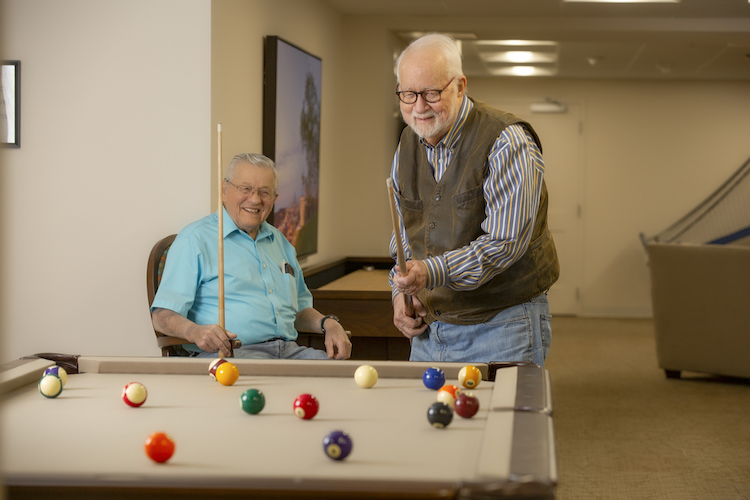Aging seniors may find it challenging to live independently as their needs change, requiring special care and living support. Once they begin noticing a shift in their daily routine, Assisted Living and Memory Care become valuable living options for older adults — but how do you know which one is right for you? Is Memory Care essential for every Dementia patient? Not necessarily! It is important to remember that every situation is unique, and each individual will require a different level of care.
Before you can decide which living environment will help you or your loved one live life to the fullest, you need to consider the qualities of both options. Explore the main differences between Assisted Living and Memory Care, along with what each option entails to get started on your journey toward luxury retirement living.
What is Assisted Living?
When independent living presents new challenges for aging seniors, Assisted Living makes it possible to enjoy autonomy and independence while receiving care and support in their day-to-day lives. Assisted Living residents are assessed by trained staff to determine the ideal level of care, and adjust this care plan as needed.
Assisted Living offers support with Activities of Daily Life (ADLs) such as hygiene routines, dining, and mobility. Assisted Living residents also experience all the benefits of a senior living community afforded to independent living residents, such as housekeeping, on-site healthcare, dining, and many other amenities.
What is Memory Care?
Memory Care, or Memory Support, involves a heightened level of care compared to Assisted Living. Memory Care residents typically struggle with Alzheimer’s or Dementia, and thus require more attentive care and memory retention support.
Keep in mind, not everyone with a memory loss disease diagnosis will need Memory Care. Many residents in the early stages of Dementia can thrive in Assisted Living! Everyone is different, so it’s important to consider all the senior living options before deciding for you or your loved one.
Memory Care vs. Assisted Living: 5 Key Differences
To help you determine which level of care is best for your unique situation, here are five key differences between senior living in Assisted Living vs. Memory Care.
1. Specialized Care
While residents in both Assisted Living and Memory Care receive support from highly trained staff, on-site caregivers for Memory Care are specifically trained in memory loss care. These specialized staff members are trained to handle the needs of those battling significant memory loss conditions, keeping our residents safe while encouraging autonomy and memory retention.
At St. Anthony’s, our goal is for every staff member to be a certified dementia practitioner. If you or your loved one start in Assisted Living, our team can provide the care you need in each living environment and help you determine the right time to transition to Memory Care.
2. Life Enrichment Activities
Both Assisted Living and Memory Care residents enjoy Life Enrichment calendars full of fun, engaging activities. Assisted Living activities span a wide range — painting class to puzzles, sewing club to shopping group! Memory Care activities, in contrast, tend to be designed around familiarity and are curated for memory retention. Since too much structure can be just as difficult for seniors experiencing memory loss as not enough structure, activities are planned with a comfortable routine and a loose structure to adapt to varying needs.
3. Community Dining
Assisted Living residents can choose three meals from a dietitian-approved menu of options each day in an inviting neighborhood dining room. Meals are provided during three consistent windows of time, giving Assisted Living residents the flexibility to decide when they’re ready to join their peers in the dining room.
Those with memory support needs may have difficulty remembering when to eat and maintaining a balanced diet, which is why Memory Care residents have more structured, family-style meal times. Staff members are there to assist residents as needed while aiming to encourage independence as much as possible. This may mean finger foods that are easier for residents to manage on their own or working with unique preferences.
4. Environment
To keep Memory Care residents safe, they live in a specialized environment designed both for their protection and to inspire memory retention. The Memory Care environment features carefully crafted nostalgia. This helps residents recall memories and act as conversation-starters to help our staff get to know the unique personalities and stories of each resident.
Memory Care residents are kept safe and secure through a non-intrusive wander monitoring system. Those experiencing memory loss may forget where they are and who their caretakers are from time to time, so this system works in tandem with 24/7 care to help them live a life of meaning in a safe environment.
5. Independence
Whether you’re a resident of Assisted Living or Memory Care, the goal is always to support you in having as much independence as possible. However, the level of autonomy available will depend on your unique needs. In Memory Care, more structure and security is essential to keeping residents safe. If this level of care is not yet needed for you, you will naturally experience more independence in Assisted Living. Memory Care is needed for those loved ones who can no longer live safely on their own and require around-the-clock support.
Determining Which Level of Care is Right for You
A Dementia diagnosis does not mean you must move immediately to Memory Care. You may thrive in Assisted Living or even Independent Living for a long time in the early stages of memory loss! At St. Anthony’s, our staff is trained and prepared to help assess you or your loved one’s specific care needs and determine the best fit.
If you’re local to the Kansas City area, contact us today to schedule a tour and ask any questions you may have about senior living at St. Anthony’s.




